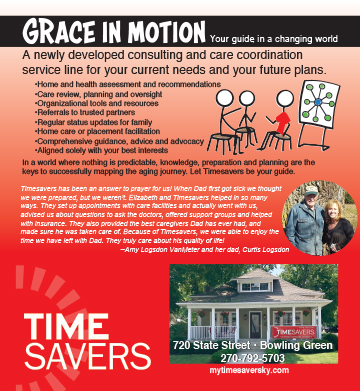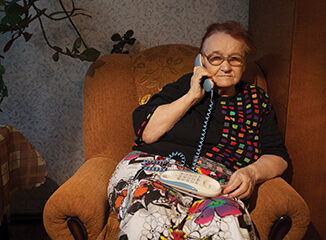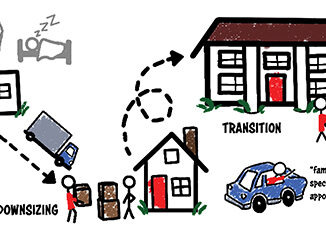
Sharon’s parents had discouraged her and her brother, Sam, from dropping in on them unexpectedly. That need for privacy wasn’t out of character for the Carsons, so Sharon and her brother had no reason to question the preference. Then Mr. Carson, a spry 78-year-old with few health problems, fell on the steps into the garage and fractured his femur.
The Carsons had always been very organized and on top of things. They were active and involved in church, volunteer efforts and social clubs. So, when Mrs. Carson suddenly seemed somewhat overwhelmed about insurance questions, legal documents and medical history, Sharon became curious.
Going to her parents’ home to gather clothes for both of them while her father was hospitalized, Sharon noticed a few things she had overlooked in the past. The bathroom wasn’t as spotless as her mom had always kept it, and she knew she and her parents had discussed how important it was to keep everything sanitized in this era of viruses. In fact, she had purchased a veritable cornucopia of cleaning supplies so her parents wouldn’t have to go to the store and fight a crowd.
Opening the refrigerator, Sharon saw two expired half-gallons of milk. Maybe they had expired in the couple of days since her dad’s fall. On closer examination, though, Sharon saw they were long expired and two new half-gallons were on another shelf. When did her parents begin drinking so much milk?
Now a little concerned, Sharon went into her dad’s study to get the few utility bills she had promised him she would bring to the hospital and help him pay. What met her wasn’t the organizational mecca her engineer father usually created. Instead there were several stacks of unopened mail, and a few checks written and dated the prior month, but obviously never mailed.
As the alarm bells went off in her head, Sharon knew she and Sam would have to open the discussion about their parents’ next steps. Where would dad need to go to rehab? Was rehab the best option during a community health crisis? Were there any other choices?
What about when he did go home, whether directly from the hospital or from rehab? Would mom be able to care for him as he recuperated? Did mom know when certain bills were due? Mrs. Carson seemed awfully anxious. What would happen if she needed help? Would Sharon need to move in with them for a while? What about Sharon’s own husband and kids? Was mom still driving? Sharon wasn’t sure about even this detail.
Was it time to think about moving from their home to a senior living community? They had always said they wanted to stay in their home forever. Was that realistic? What were the choices? How would they decide what was actually viable? Sharon was pretty sure her parents had never toured any places, although they had friends who had recently moved to assisted living. What was assisted living vs. independent living?
Who was their attorney? Who was their financial advisor? The only reason Sharon was 100% sure of the primary care physician was because Dr. Stone had stopped by the hospital and introduced herself. Sharon and Sam realized they had no idea about what would happen next, and they weren’t sure their parents knew either.
One thing Sharon did know was that it was time she and her husband, Rob, made their own plan, and began the discussion with their three kids – all young adults – about where important information was kept and who to contact if something happened. They needed to talk about what Sharon and Rob did want, and just as important what they did not want, if questions arose and decisions had to be made.
Sharon wasn’t upset with her parents. She didn’t mind tackling a problem. But she knew the situation could have been avoided. She recognized how important and helpful it could have been if she and her brother had tried much earlier to open the door to the conversation about where the road would lead as her parents aged. She realized the stress she would be taking off her own children by having that conversation openly and honestly right now.
The other thing that became crystal clear? Sharon and Rob needed some guidance. They had a will that had been drawn up when their children were young. Did it need to be redone? What about their finances? Alzheimer’s Disease was prevalent in Rob’s family. Was that a curve in the path for which they should have a contingency plan?
What about long-term care insurance? Is that even still a thing, or are there better choices? Who do you talk to about things like that? Was their life insurance up to date? Did they need to get baseline physicals?
Sharon felt like she and Rob were in better health than ever. At 50 years of age, she had not considered how important a plan would be for their family. The realization had hit her hardest as she had gathered her dad’s few medications to take to the hospital for the staff to review. Even the meds had seemed a little off. It was a moment of clarity she hadn’t expected. She and Rob needed to begin this journey.
Does any of this sound familiar? Planning, preparation, open dialogue, connecting with the right guidance and resources, knowing your life care advisor and coordinator has only your best interests in mind when making recommendations – these are more important today than ever before. We know now that all potential choices should be on the table and evaluated in order to make the best decisions.
Having a resource that serves as your compass, directing you to the services and contacts you need, advising you and advocating for what is solely in your best interest – this is the ideal path we will all travel.
Grace In Motion, Timesavers’ newest and most comprehensive service offering, can be your navigator, your map-creator, the sturdy ground under your feet. Life is a journey. It curves, it has stops we don’t expect, and sometimes we don’t recognize the signs. An expert will help you assess, make important decisions, plan and actually implement choices and changes.
Now is the time to look at your plan, at your roadmap. Now is the time to create peace of mind for yourself and your family. Now is the time to allow grace to find its place in your life journey.
-by Elizabeth Downing
About the Author: Elizabeth Downing is Director of Outreach for Timesavers Concierge, Caregiving & Chauffeur. A 1982 graduate of WKU, Elizabeth found her passion in advocating and providing care for older adults and those with special needs. Timesavers seeks to raise awareness of issues relating to aging and caring for aging loved ones, and works to provide the highest quality care available. Elizabeth has completed a Certificate in Care Management from Boston University, is a Teepa Snow PAC Certified Independent Consultant, and facilitates a family caregiver support group each month.




